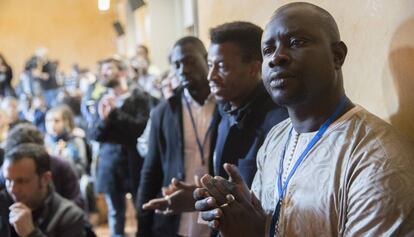Barcelona’s street vendors find way to live without fear of the police
Fifteen former peddlers of counterfeit goods form cooperative to sell handicrafts at local markets

Fatu Ndeye arrived in Spain in 2010 on a tourist visa. The 35-year-old Senegalese ended up hawking trinkets around the streets and beaches of Barcelona to tourists, like dozens of other mainly undocumented African immigrants, who often set up their wares on cloths alongside each other on the seafront, avenues or squares of the city, keeping an eye out for the police, who have cracked down in recent years on what is known as top manta.

On Thursday morning in Barcelona, 15 such unlicensed street vendors, 12 men and three women, launched a cooperative, set up with the help of Barcelona City Hall, to help provide a legal way to make a living. Only three of the team have their residency and work permits. The rest are waiting for their papers to be processed.
Ndeye, despite not having his papers in order, has been elected head of the Diomcooop cooperative: “Diom means dignity, hospitality and strength,” he told reporters at the launch.
People do not set out to become unlicensed street vendors Barcelona deputy mayor
Last September, around 80 street vendors responded to City Hall’s offer of help to set up a cooperative. Only 15 were selected. Since then they have received a grant of €500 a month and attended training sessions and divided the business into different areas: Communication, administration, logistics, and social cohesion. In return, they have had to stop selling on the streets.
Diomcoop aims to provide its members with access to traveling markets and fairs, where they will sell fair trade goods, along with clothing, jewellery and handmade art and decorations.
Gerardo Pisarello, Barcelona’s First Deputy Mayor, told reporters at the launch of Diomcoop that 234 sales points throughout Barcelona will be available for Diomcoop members each year, such as Fleedonia, Flea Market, el Rastro de la Virgin, the Mercat de Segona mà de Sants, el Traster de Can Ricart. Pisarello admitted that the cooperative would not solve the problem of street vendors in Barcelona overnight, but noted: “People do not set out to become unlicensed street vendors, and they should have the same rights as anybody else.” He hopes that between five and 10 people will join the cooperative each year.
I looked for work from the start, but I have always ended up selling bags and scarves on the cloth
Pape Diop, one of the cooperative’s three members whose papers are in order, arrived in Barcelona in 2009. “I looked for work from the start, but I have always ended up selling bags and scarves on the cloth,” he said. Diop set up a union of top manta sellers to draw attention to what he saw as police harassment.
“I am really looking forward to starting work,” said Diop at the launch. Fatu Ndeye admits that getting the cooperative off the ground will be hard work to begin with, but that he is optimistic: “It’s the start of a lot of good news: on Sunday I am getting married.”
English version by Nick Lyne.
Tu suscripción se está usando en otro dispositivo
¿Quieres añadir otro usuario a tu suscripción?
Si continúas leyendo en este dispositivo, no se podrá leer en el otro.
FlechaTu suscripción se está usando en otro dispositivo y solo puedes acceder a EL PAÍS desde un dispositivo a la vez.
Si quieres compartir tu cuenta, cambia tu suscripción a la modalidad Premium, así podrás añadir otro usuario. Cada uno accederá con su propia cuenta de email, lo que os permitirá personalizar vuestra experiencia en EL PAÍS.
¿Tienes una suscripción de empresa? Accede aquí para contratar más cuentas.
En el caso de no saber quién está usando tu cuenta, te recomendamos cambiar tu contraseña aquí.
Si decides continuar compartiendo tu cuenta, este mensaje se mostrará en tu dispositivo y en el de la otra persona que está usando tu cuenta de forma indefinida, afectando a tu experiencia de lectura. Puedes consultar aquí los términos y condiciones de la suscripción digital.








































